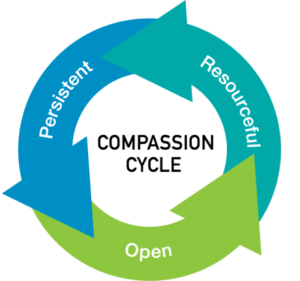
Compassionate Accountability: A Both-And Breakthrough
Share viaThe launch of our newest book in July has given heightened exposure to the concept of Compassionate Accountability®. We are delighted that this book is selling so well, and has already won two awards. Although the book is new, the concept isn’t. We pioneered the notion of Compassionate Accountability ten years ago. Here is one of my first posts to mention the concept, a fitting topic for the holidays.
Compassionate Accountability was also featured in our book, Conflict Without Casualties: A Field Guide for Leading with Compassionate Accountability. This is where we described ORPO, our model for positive conflict that combines compassion and accountability.
How to apply ORPO during conflict.
Compassion VS Accountability: An Artificial Dichotomy
The majority of leaders we work with have come to believe that compassion and accountability are in tension, somehow working against each other. Consider these phrases:
“You can’t be somebody’s friend and boss at the same time.”
“If you show vulnerability, people will take advantage of you.”
“Sometimes, you have to show people who’s really in charge.”
As a result, leaders concede that you can’t have both, or at least you will have to choose one over the other in certain circumstances. This artificial dichotomy sets up a no-win situation where we feel cornered into committing a “necessary evil” by choosing one over the other. It also prevents us from considering a third way.
Compassion without accountability gets you nowhere. Accountability without compassion gets you alienated. Blending the two is the essence of great leadership. Let’s take a look.
Compassion Without Accountability
- Believes listening, consensus, and empathy are sufficient motivators of behavior.
- Avoids asking directly for things.
- Views confronting negative behavior as uncaring and mean.
- Common philosophy includes, “Be nice,” “Don’t hurt other people’s feelings,” “Put yourself in her shoes,”
- Results in poor follow-through and low confidence that goals will be accomplished.
- Leaders are liked but not respected.
- Agreement without commitment.
Accountability Without Compassion
- Believes rules, consequences, and expectations are sufficient motivators of behavior.
- Avoids listening.
- Views empathy as a sign of weakness.
- Common philosophy includes, “Failure is not an option,” “High expectations are necessary,” “Sometimes you have to show them who’s boss.”
- Promotes low morale and trust
- Leader are feared but not respected.
- Compliance without loyalty.
Compassionate Accountability: Both-And Breakthrough
Compassionate Accountability is about building stronger relationships while getting results. No compromises. This both-and breakthrough becomes possible when you recognize that compassion means “to struggle with” others for a better future. It doesn’t mean being nice or only showing empathy. Compassion includes accountability for feelings, thoughts, and behaviors. You can’t practice compassion without accountability.
Compassionate Accountability requires three fundamental skills.
- Openness to one’s own and other’s feelings, needs, and wants – validates emotions without commiserating or discounting.
- Resourcefulness around problem-solving – curiously explores possibilities without taking over responsibility for the solution.
- Persistence around commitments, goals, and boundaries – without threats, ultimatums, or implicit expectations.
The Action Is In The Interaction
Compassionate Accountability is great in theory, but actions speak louder than words. I’m regularly surprised by organizations we speak with who preach compassion and accountability but don’t know how to implement it in real conversations. They say it’s safe to speak freely, but they avoid necessary conflict because they don’t don’t want to be mean. They preach inclusion, but they don’t know how to have real conversations around vulnerability.
What’s your experience? Do you struggle to walk the talk in your organization?
Many leaders in these organizations reveal that they recognize the gap, but don’t know how to practice Compassionate Accountability when it matters most. “Just give me the words,” is a plea we hear frequently.
That’s why our entire focus at Next Element is to provide practical frameworks and strategies for implementing Compassionate Accountability in every interaction. The Compassion Cycle is the “engine” behind it. Blending Openness, Resourcefulness, and Persistence in specific ways helps people have difficult conversations and navigate challenging situations with Compassionate Accountability.

Each skill on The Compassion Cycle has observable behavioral strategies that can be learned. The Compassion Cycle has rules and principles that, when followed, lead to positive outcomes, and when violated, lead to drama.
How to recognize and stop workplace drama.
Compassionate Accountability is a rare combination. The good news is that anyone can learn it and break free from the artificial dichotomy that you have to choose one over the other.
Copyright Next Element Consulting, LLC 2023
Start Your Both-And Breakthrough Today
Book Your Next Keynote Speaker

Author and Co-founder of Next Element, Dr. Nate Regier is available to speak at your upcoming event.
Submit a Speaker RequestListen to Nate on The Compassionate Accountability Podcast
 Listen to the Podcast
Listen to the Podcast

0 Comments
Add comment